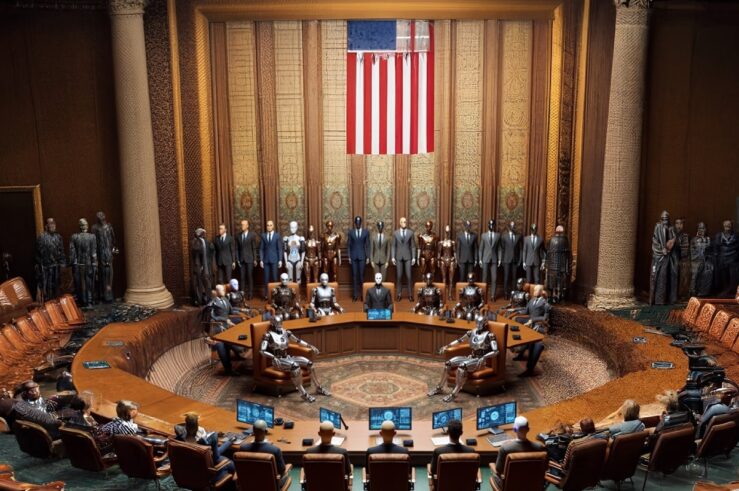In my previous post, I sketched out some trends in the Law & Economics movement in recent years. Specifically, I’ve focused on the trends towards increasing mathematical formality and specialization within economics as a stand alone discipline. The post triggered some thoughtful responses from Larry Solum and Larry Ribstein for which I am grateful. I also received a number of responses in private which asked, rather bluntly, “So what?” The point was that even if everything I claimed about trends in economics and L&E were true, perhaps the result would be L&E scholars being more detached from the legal academy and migrating to economics departments. Again, so what? L&E work would be getting done by somebody somewhere. More than one of these private responses included the observation that maybe L&E types should be in economics departments anyway where there are tougher tenure standards, peer review, and less pay.
I planned on jumping in to the issue of where I think L&E in law schools is heading (including the issue of theory versus empirical work that David Zaring raised in the comments to the first post) and then what law schools and other institutions could do to solve the “problem.” But it seems like I might have more work to do to establish that the movement of L&E away from the legal academy would, indeed, be a real problem worth solving. So, in this post I’ll try to make the case that the trends highlighted in the first post, despite the benefits of mathematical rigor and precision, should give L&E scholars pause. The next three posts will get into the details of how I think this trend will play out in law schools, economics departments, and in legal scholarship itself.
My sense is that the increase in mathematical rigor poses special problems for L&E for several reasons. The primary reason is that the historical success of law and economics turns at least in part of its unparalleled success at the retail level. First and second generation producers of law and economics scholarship — think Director, Alchian, Coase, Williamson, Posner, Easterbrook, Calabresi, Stigler, Demsetz, and others — were able to “sell” important economic insights to lawyers, judges, policy audiences and the legal academy more broadly. Henry Manne took advantage of the power and accessibility of the economics insights from these L&E scholars by bringing them together at Economics Summer Camps to teach economics to law professors. The newly educated law professors would in turn, retail the power of economic thinking to law students. A similar process would take place with efforts to teach federal judges basic microeconomic theory through the George Mason Law and Economics Center programs which were also a brainchild of Henry Manne (this seems like a good place to plug Larry Ribstein’s essay on Henry Manne: Intellectual Entrepreneur which is forthcoming in a book I am co-editing with my colleague Lloyd Cohen on the Pioneers of Law and Economics).
In any event, the point is that much of the success of L&E owes to its success at the retail level. Antitrust is a wonderful example of the success of L&E. There is perhaps no other area where economic theory is integrated into the law. But even in areas where economics have not completely dominated the intellectual discourse, L&E has been an important voice in academic and policy debates in many areas of the law. Its voice is one that pushes for an understanding of how economic agents will respond to changes in the law, how markets work, and how markets respond to legal change. No matter whether one adopts the L&E worldview, as I do, I don’t think there is much debate the L&E has added a significant and valuable perspective to legal discourse. Indeed, one can make the case that its impact has been mores strongly felt than any other interdisciplinary approach to the law. The recent trend towards detachment from the retail audiences, from this perspective, is a special historical development in L&E. It is also one that is quite troublesome from the perspective of an L&E scholar who would like to see the field retain its influence. L&E scholarship, it seems, is at a crossroads. The concern is not just that L&E scholarship as we know it will move to economics departments. After all, economics departments do not currently value much of the work that is done by L&E scholars. The concern is that L&E scholarship as we know it will disappear altogether.
So far, I’ve unfairly painted a picture of formal methods in economics as ruining L&E without any upside. This may appear odd coming from somebody who does some modeling and econometrics in his own research. So let me make sure I’m being clear. Mathematical rigor and formality is not without its benefits. Modeling can help generate testable implications. Mathematics can force out into the daylight hidden assumptions and make explanations more precise in a unique way. Like any other tool in economic science, mathematical modeling can produce insights for some problems but maybe less so for others. It would neither make sense to claim that L&E left no room for the sort of detailed institutional analysis and exposition supplied by Alchian, Coase, Williamson, Klein, Demsetz, or Tullock than it would to claim that L&E should ignore the insights generated by careful theoretical or econometric work. Though I do quite a bit of econometric work in my own research, I do believe (perhaps to the chagrin of my econometrician friends) that there is still some important empirical work to be done in L&E that doesn’t necessary involve large scale datasets and statistical analysis.
Frequently, discussions of the increased formality of economics also include the observation that it has become pretty easy to run a regression with modern statistical software packages. This is also an important development in L&E scholarship and empirical legal scholarship more generally. I agree with others who have observed that the reduced costs to doing empirical work has become a problem in L&E scholarship in the legal academy. It is certainly true that legal scholars will make improper use of econometric tools from time to time. It is also true that misuse of empirical methods is less likely to be prevented by the peer review mechanism. Though on the positive side of the ledger, conferences like CELS are doing excellent work to raise the bar for empirical scholarship. Similarly, economists may fall prey to the mistake of letting the tools and methods determine which questions they answer, perhaps because the tools and methods determine what is publishable in top journals, or produce models or econometric work that is of little relevance. Neither of these errors are particularly interested to me, though I suspect the incidence of both errors has grown dramatically over time with the increasing demand for empirical legal scholarship and also changes in economic science over the past 30 years.
While I’ve focused on the costs of formalization and specialization throughout this and future posts, I do not want to be misunderstood as leveling the “physics envy” critique at economists, e.g. that economists use modeling as a thinly veiled attempt to make their work look more serious or to adopt a complex language to increase barriers to entry (an accusation most lawyers should be familiar with). For instance, a significant portion of my own research agenda involves some theoretical modeling and econometrics. As an aside, I’ve always thought that particular rhetorical critique (“physics envy”) was not very effective. Formalization clearly has both benefits and costs. The question I am interested in is how this change in economic science will change L&E as a discipline — its already started — and as we know it in law schools.
The increase in mathematical rigor in economics has translated, not surprisingly, into work in L&E that also makes increasing use of formal modeling or econometric methods. One consequence has been something I described as the “retail problem” in my last post:
L&E scholars will do work that is very relevant, and maybe even very good, but legal scholars wont know about it or care about it because of the “translation” issues associated with the formal mathematics will prevent it from being retailed to broader audiences, (the “retail” problem)
In other words, increased formalization has meant that a larger fraction of relevant and high quality L&E work has become less accessible to lawyers, judges, and policy makers. A simple way to describe this trend towards increased formalization might be as a movement toward of L&E towards the prevailing methods and trends in its home discipline. One might question whether this is a problem at all. For the reasons discussed above, I think it is. And at the very minimum, this trend has serious implications for the direction the L&E movement is headed in law schools and in legal scholarship.
The rest of this series, hopefully, will discuss various aspects of this problem. There are at least three immediate questions I think worth discussing concerning the implications of this trend of L&E generally:
(1) What will L&E scholarship in law schools look like in the future? This encompasses questions like whether informal L&E will be “crowded out” as the work becomes increasingly detached from, and presumably less valuable to, not only its intended audience but also colleagues in the law school. It also encompasses questions like whether “serious” L&E scholars will migrate towards economics departments leaving law schools behind. (Larry Solum raises this and other possible scenarios in a very thoughtful response to this post which also addresses how this trend might play out in the legal academy more generally).
(2) What efforts can be made to secure the benefits of specialization and formality while minimizing the likelihood of detachment from the traditional “legal” audience? This line of questioning presumes, I think correctly, that detachment would be a serious blow to the L&E movement and encompasses questions like: What role can law schools and other institutions play in ensuring that L&E remains interdisciplinary (not leaning too far toward its “home discipline”) and relevant?
(3) Does This Trend Have Implications for Law School Specialization? Larry Solum suggests that one possible path is the multidisciplinary model where graduate students would be trained in the basic methodologies of their discipline (the law) and PhD programs that trained in specialties such as empirical legal studies, economics, positive political theory, advanced doctrinal methods, etc. As law school specialization is a topic I’ve written about here previously (here, here and here), and a model that I’m familiar with here at George Mason, one might ask whether this trend toward formal L&E scholarship will impact schools like George Mason who have staked out a position as a school that specializes in L&E?
I plan on writing a separate post addressing each of these three questions over the next week or so.




